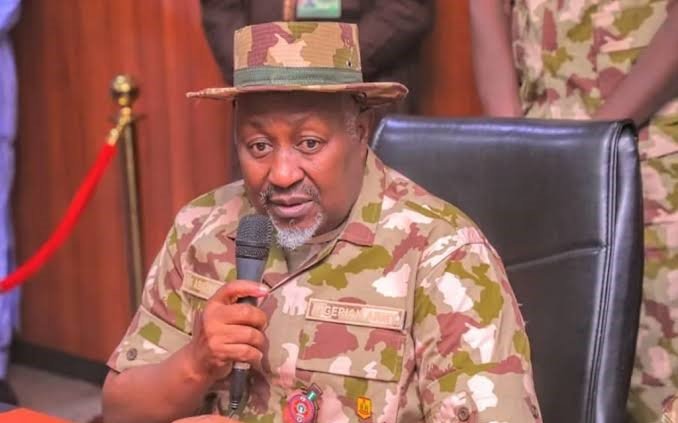NIGERIA’s security landscape has been a persistent and complex challenge, characterized by a multitude of threats that have evolved in intensity and scope over the past decades.
From the Boko Haram insurgency in the North-East to widespread banditry, kidnapping, and farmer-herder conflicts across various regions, the nation has grappled with a multifaceted security crisis that has profoundly impacted its stability, economy, and the well-being of its citizens.
The persistent nature of these challenges has led to significant debate and varying theories regarding their root causes and the most effective strategies for mitigation, often leaving both policymakers and the public befuddled by the seemingly intractable nature of the problem.
A Nigerian defense minister, regardless of their strategic acumen or dedication, is certain to face a labyrinth of difficulties in tackling the nation’s entrenched security challenges.
They will inherit an armed forces often described as under-resourced, plagued by corruption, and suffering from low morale, making effective operational deployment and sustained campaigns incredibly challenging.
Furthermore, the minister must navigate the complex interplay of political interference, regional rivalries, and ethnic considerations that often undermine national security strategies. The pervasive issue of governance deficits, including a lack of accountability and transparency, will hinder efforts to implement lasting reforms and build public trust, which is crucial for intelligence gathering and community support.
Addressing the root causes of insecurity, such as widespread poverty, youth unemployment, and climate change-induced resource scarcity, falls beyond the direct purview of the defense ministry but directly impacts the security landscape, creating a perpetual cycle of conflict that military solutions alone cannot resolve.
This paints the exact picture of the scenario met by the Minister of Defense, Mohammed Badaru Abubakar, when he assumed office two years ago.
Badaru knew at the earliest stage that he will contend with the sophisticated and adaptive tactics of various non-state armed groups, from well-entrenched insurgencies to fluid bandit networks, often operating across porous borders and exploiting local grievances, demanding a multi-faceted approach that extends far beyond conventional military responses.
He therefore took the bull by its horn.
Not wanting to disappoint Nigerians, and being conscious of the trust President Bola Ahmed Tinubu’s Renewed Hope Agenda had in him, the Defense Ministry under his watch took a multi-layered approach to combat insecurity blending military strength, intelligence coordination, defense industrialisation, regional partnerships, and grassroots engagement.
A key priority has been the welfare and capability of the Nigerian Armed Forces. The Minister revealed in a recent briefing that the Federal Government has increased ration allowances, ensured timely payment of benefits, and provided life insurance for troops in active duty.
In parallel, there has been an aggressive push to modernise military hardware, with acquisitions of attack helicopters, mine-resistant vehicles (MRAPs), drones, and armored carriers now being deployed to hot zones across the country.
Perhaps the most transformative effort is Nigeria’s growing push for defense self-reliance. The Defense Ministry is overseeing a revival of the Defense Industries Corporation of Nigeria (DICON), working with over 50 domestic firms to manufacture military equipment, ammunition, ballistic vests, and helmets. The goal: to begin exporting locally-made military hardware before the close of 2025.
On the battlefield, military operations such as Operation Hadin Kai in the North East and Operation Fasin Yamma in the North West have reportedly yielded major victories. According to data provided by the Ministry, over 13,000 terrorists and bandits have been neutralised, nearly 10,000 hostages rescued, and more than 24,000 insurgents have surrendered under government initiatives like Operation Safe Corridor.
Hence, there have been significant improvements in travel safety along previously dangerous routes such as the Birnin Gwari-Kaduna Road, Zaria-Funtua axis, and the Abuja-Kaduna highway, as military presence and tactical operations have made these roads safer for civilians and commerce.
Significantly, it could be seen that the Ministry is not limiting its efforts to kinetic warfare. In a shift from past strategies, the Defense Ministry is investing heavily in intelligence-gathering, psychological operations, and community-based partnerships.
Efforts are being made to detect and dismantle terrorist supply chains, identify collaborators within communities, and block drone imports used by insurgents.
One very difficult challenge has been the persistent threat of “fifth columnists” individuals within Nigeria who leak information to enemy elements but then, counterintelligence efforts are being intensified to neutralise these threats.
It is noteworthy that in the oil-rich South-South region, the Defense Ministry has intensified crackdowns on oil theft and pipeline vandalism. Illegal refineries are being dismantled, vessels seized, and illegal crude storage depots destroyed.
The result, Badaru said, has been a measurable increase in national oil output, securing Nigeria’s economic lifeline.
The Ministry’s achievements have not come in isolation. Badaru’s acumen in courting regional cooperation through platforms like the Multinational Joint Task Force and partnerships with ECOWAS members are enhancing cross-border intelligence and operational coordination, especially in the fight against Boko Haram and ISWAP along the Lake Chad Basin, was instrumental.
The minster had recognized at the onset that that military might alone cannot resolve Nigeria’s complex insecurity, and had stressed the importance of addressing root causes poverty, unemployment, extremist indoctrination, and local grievances.
He said programs are being scaled up to deradicalise and reintegrate surrendered fighters, particularly youth manipulated into violent ideologies.
As Nigeria enters the final quarter of 2025, Minister Badaru expressed cautious optimism. He affirmed that President Tinubu has given a clear directive: end major security threats decisively within the year.
“We are not under illusions. This war is not conventional. But our troops are more determined than ever, and our strategy is now smarter, more integrated, and more accountable,” he stated.
While some critics argue that insecurity still persists in parts of the country, especially in isolated rural communities, the Defense Ministry maintains that significant progress has been made and the goal of a more secure Nigeria is finally within reach.
- Abubakar, a political analyst, writes in from Abuja.







